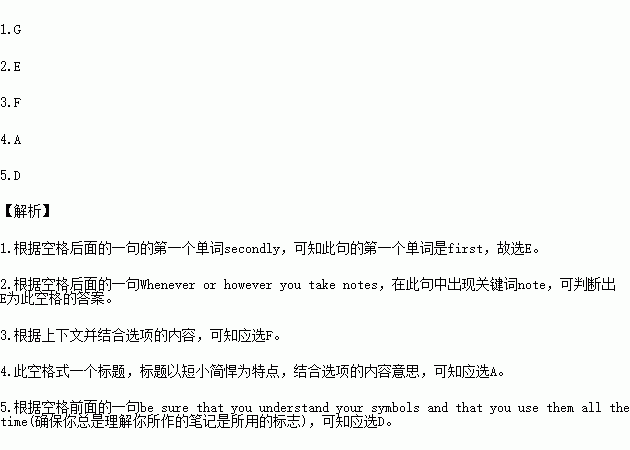
Taking good notes is a time-saving skill that will help you to become a batter student in several ways 1.Second, your notes are excellent materials to refer to when you are studying for a test. Third, note-taking offers variety to your study time and helps you to hold your interest。
You will want to take notes during classroom discussions and while reading a textbook or doing research for a report2.Whenever or however you take notes, keep in mind that note-taking is a selective process.3.
The following methods may work best for you.
●Read the text quickly to find the main facts and ideas in it.
●Carefully read the text and watch for words that can show main points and supporting facts.
●Write your notes in your own words.
● 4.
●Note any questions or ideas you may have about what was said or written.
As you take notes, you may want to use your own shorthand(速记). When you do, be sure that you understand your symbols and that you use them
all the time. 5.
A. Use words, not complete sentences.
B. There are three practical note-taking methods.
C. You must write your notes on separate paper.
D. Otherwise, you may not be able to read your notes later.
E.you will also want to develop your own method for taking notes.
F.That means you must first decide what is important enough to include in your
notes.
G.First, the simple act of writing something down makes it easier for you to understand and remember it.
学英语报社报纸答案 2021-2022 高二试题答案
FOR thousands of years, Stonehenge has confused visitors with a seemingly unanswerable question: Why would anyone carry so many huge stones across Britain and put them in a ring? It seems even stranger when you think of the fact that it was done by prehistoric people working without modern technology, not even a wheel.
Stonehenge has started endless debates over the centuries. Experts have said at different times that it was a temple, a calendar (日历) or a graveyard (墓地).
Yet “all the ideas to date could be mistaken,” said Julian Spalding, a famous art critic (评论家) and former director of some of the UK’s leading museums. “We’ve been looking at Stonehenge the wrong way: from the earth, which is very much a 20th century viewpoint,” he told The Guardian.